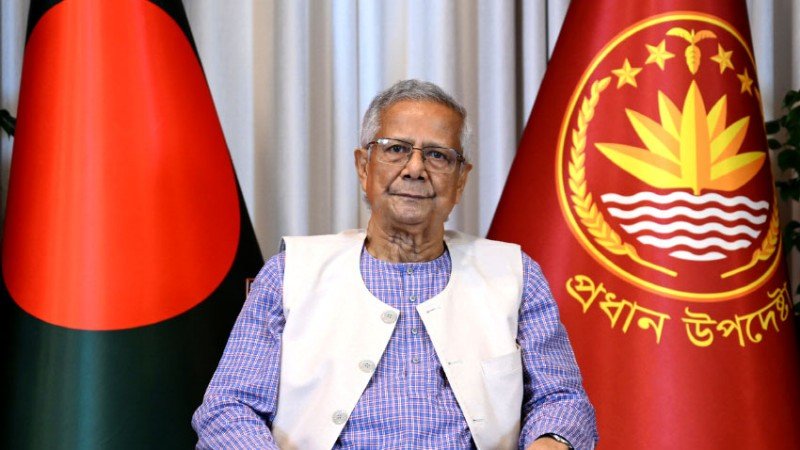CA outlines post-uprising progress, calls for February 2026 elections
Published: 05 August 2025, 11:41:02

Marking the first anniversary of the July Uprising, Chief Adviser (CA) Muhammad Yunus addressed the nation on August 5, highlighting sweeping reforms, economic recovery, and the roadmap toward a national election in February 2026.
On August 5, Chief Adviser Muhammad Yunus delivered a nationally broadcast address to commemorate the July Uprising Day, recalling the mass movement that ended years of autocratic rule in Bangladesh.
He paid tribute to those killed or injured during the 2024 uprising and reflected on the transformative year since the movement reached its climax.
“One year ago today, our beloved nation broke free from long-standing fascist rule,” Yunus said. “The July Uprising was not only a turning point but also a collective awakening.”
The uprising began in response to a controversial court ruling reinstating quotas in government jobs, which sparked widespread protests led by students. According to Yunus, brutal repression, indiscriminate firing, and killings by state forces fueled the resistance, with women standing courageously at the frontlines.
Since assuming power under an interim framework, the government focused on three core responsibilities: reform, justice, and preparing for elections.
Reform commissions were established across sectors, resulting in key recommendations. Among them, 19 fundamental reforms reached broad consensus among over 30 political parties through the newly formed National Consensus Commission. These included steps to boost transparency, accountability, and institutional independence.
The culmination of these efforts is the “July Charter,” a political consensus document which Yunus hailed as a historic milestone in Bangladesh’s democratic journey. He credited political leaders and especially Professor Ali Riaz, who led the consensus process.
Yunus reiterated his earlier promise to hold parliamentary elections by June 2026. In his address, he formally announced that a letter would be sent to the Chief Election Commissioner to organize the national elections in February, before the Islamic holy month of Ramadan.
“The time has come to hand over the reins to an elected government,” he said. “We urge every citizen to make this election a celebration of democracy.”
He emphasized inclusivity, particularly for first-time voters, women, and the diaspora. The government is working to ensure overseas Bangladeshis can vote, recognizing their contribution through record-high remittance flows.
Bangladesh has seen a dramatic turnaround in economic performance over the past year. Inflation, once at 14%, has fallen to 8.48% in June—its lowest in 35 months—with hopes to bring it down to 6% by December.
Yunus noted a record $30.33 billion in remittances, 9% growth in exports, and rising foreign direct investment—especially a $250 million commitment from China’s Handa Group, expected to create 25,000 jobs.
“From a collapsed economy to one on the rise, our recovery in just a year was unimaginable,” he said.
The government also took steps to recover wealth laundered abroad, hiring international legal firms to pursue illicit assets.
Yunus committed to depoliticizing education institutions and improving school infrastructure, particularly for girls. Key initiatives include internet-equipped classrooms, e-learning in remote schools, and solar panels to tackle power shortages.
In media, the controversial Cyber Security Act has been repealed, along with all cases against journalists under the former Digital Security Act. “Even state-run media now permit criticism of the government,” he said.
A newly passed ordinance requires that detainees be presented to court within 12 hours, granted access to legal counsel, and receive medical attention if injured—steps aimed at curbing abuse by law enforcement.
Reforms in the police include establishing human rights cells, body camera usage, and banning deadly force in crowd control. Sixteen major police reforms have been completed, with 43 more underway.
The government has distributed nearly Tk 100 crore in savings certificates and monthly stipends to 775 families of those killed in the uprising. Over Tk 153 crore has been disbursed among 13,800 wounded fighters. Severely injured individuals have been sent abroad for treatment at government expense.
Additionally, thousands of public institutions renamed by the former regime have been restored to appropriate titles, Yunus said.
With elections approaching, Yunus urged citizens to regularly visit their constituencies, identify competent candidates, and vote with the memory of those who sacrificed for democracy.
“February is not far. This vote must be a collective celebration—a festival of freedom,” he said. “Let no one be left behind.”
He warned of attempts by “defeated forces” to sabotage the democratic process but assured that a transparent election would ensure their final defeat.
A new mobile app will soon be launched to gather citizen feedback on the election process.
Yunus underscored plans to develop Bangladesh’s maritime economy, calling the Bay of Bengal a “neglected half of the country” rich in untapped resources like fish and gas. Reforms in port management, including the Chattogram Port, are expected to boost trade across South Asia.
Coastal areas are being developed into economic hubs, and discussions with partner countries have begun to ensure sustainable use of maritime resources.
Visa restrictions have been lifted or eased for Bangladeshi workers in the UAE, Malaysia, Saudi Arabia, and other nations. Programs are underway to send at least 100,000 youth to Japan over the next five years, and more skilled workers to South Korea, Italy, and Serbia.
A “Labbayk” app enabled 87,000 Bangladeshi pilgrims to perform Hajj with improved support, which Yunus noted was praised across South Asia.
Chief Adviser Yunus concluded by urging national unity in the run-up to the election and honoring the memory of the July martyrs through democratic participation.
“Let us build a new Bangladesh together,” he said. “One where tyranny can never rise again.”





